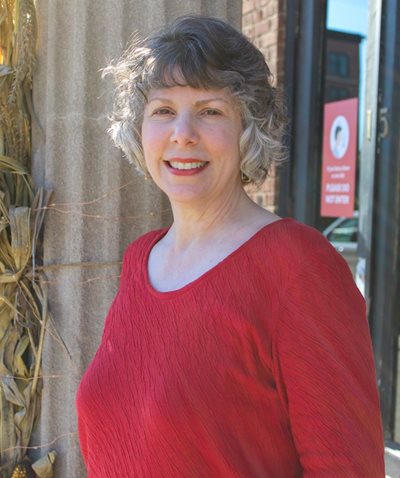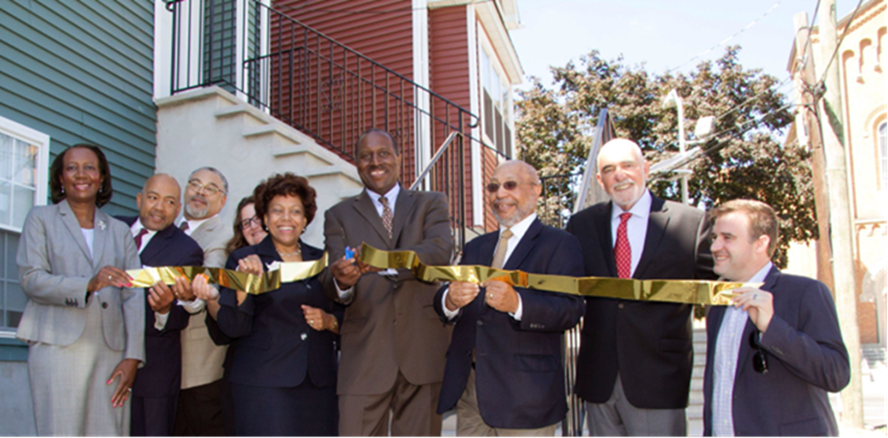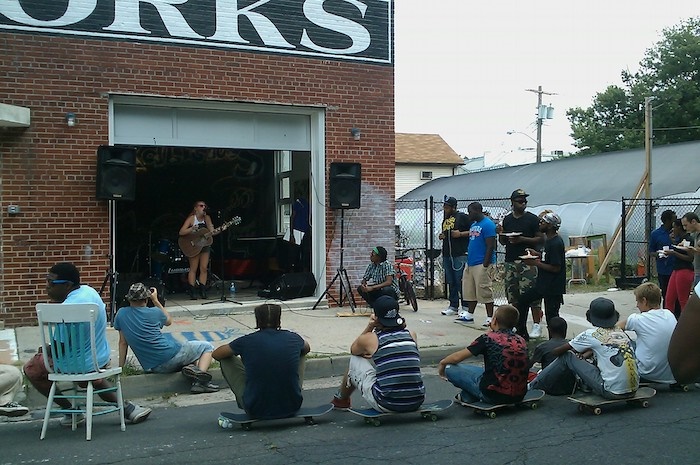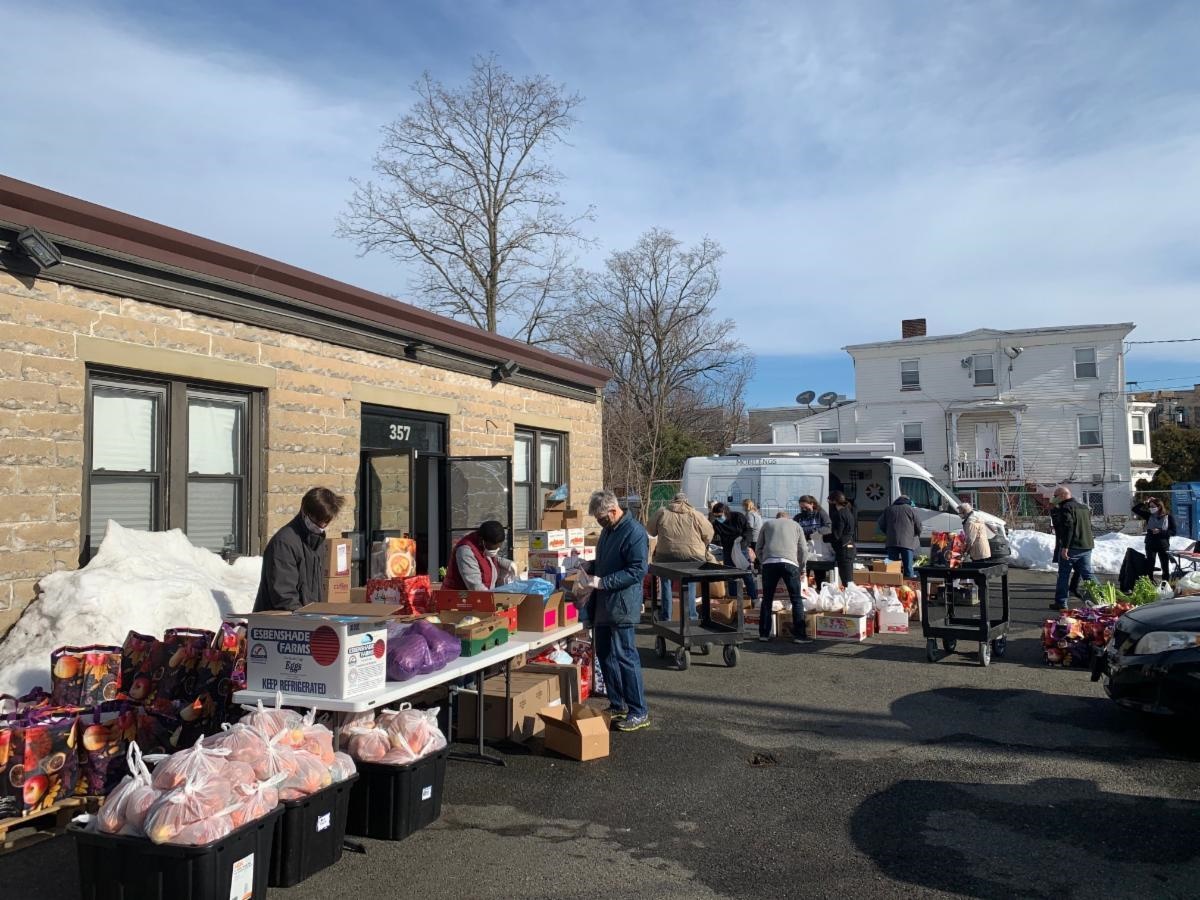When you attend a NeighborWorks training, there's a good chance you may see Robin Gordon. She's been learning with NeighborWorks for over 15 years. She's incorporated what she's learned into her work so much, that when she shares ideas in staff meetings, her colleagues expect her to end with "I learned that at NeighborWorks training." In fact, it's become somewhat of an office slogan.
 Gordon is the director of administration for Housing and Neighborhood Development Services, Inc. (HANDS), a NeighborWorks organization based in Orange, New Jersey, adjacent to Newark in the New York metropolitan area. "We have eight employees, so I always call us small, but mighty," she says. "Part of being mighty is being armed with the right tools, and NeighborWorks training has been a key to our success."
Gordon is the director of administration for Housing and Neighborhood Development Services, Inc. (HANDS), a NeighborWorks organization based in Orange, New Jersey, adjacent to Newark in the New York metropolitan area. "We have eight employees, so I always call us small, but mighty," she says. "Part of being mighty is being armed with the right tools, and NeighborWorks training has been a key to our success."
Gathering people together face-to-face is a major part of her work, so when the pandemic forced community development nonprofits like Gordon's to switch to operating virtually, she and her coworkers faced the formidable challenge of engaging residents and local businesses in an online-only format. Determined to continue their work virtually, the HANDS team decided to focus on three organizational strengths to navigate the pandemic: their role as a collaborative catalyst for community change; their ability to leverage their existing resources, contacts, and skills; and the staff's ability to learn and evolve. A key part of the plan was to begin the process of offering financial capability training and financial coaching services to community residents.
"Our mission is to help create neighborhoods of choice where families and businesses want to stay and are able to stay," Gordon says. That means helping them build sustainable futures and reducing inequities. "The whole situation we've been through the past year has only underscored the importance of wealth building and having our constituents be able to find a road they can walk down for wealth building," she says.
Gordon has been tasked with leading the formation of the organization's financial capability program, even though it doesn't directly relate to resource development. The program isn't ready to be a line of business yet, but in preparation, she attended the NeighborWorks Virtual Training Institute (VTI) to delve into courses on financial capability and financial coaching, get an overview of the topic, and learn best practices.

“The relevancy provided with our online trainings provides professionals in the community development and affordable housing fields with tangible skills, tools, and resources they can immediately implement in their communities. Putting into practice this new knowledge can create and influence positive change,” says Cristi Ford, senior vice president of training for NeighborWorks America. Beginning in June 2020, the Wells Fargo Foundation partnered with NeighborWorks to provide complimentary scholarships for these trainings. To date, the foundation has awarded more than 13,000 scholarships.
NeighborWorks Online Training Scholarships – Underwritten by Wells Fargo
Gordon is working on her Financial Capability certification through the NeighborWorks Center for Homeownership Education and Counseling (NCHEC). Thanks to a Wells Fargo Foundation scholarship, she took the Building Skills for Financial Confidence online self-guided course, one of three trainings required to earn the certification. Scholarships from the Wells Fargo Foundation made preparing for the financial capability program possible. The combination of the support from Wells Fargo and the targeted training from NeighborWorks helped the team follow through with their efforts.
At the VTI, Gordon took Understanding the Skills Needed to be a Successful Financial Coach to get an overview of the topic. She took the Using Financial Coaching Techniques to Engage and Motivate Clients course to learn how to best apply those skills, and the third course she took was Innovative Approaches to Building Financial Capability, to hear how other organizations have successfully run their financial capability programs. During the event, she also participated in a "Brain Date," a chance to discuss ideas with peers. The group conversation was helpful, as there was a strong discussion on jumpstarting financial capability workshops as virtual workshops—exactly what HANDS is seeking to do.
When HANDS previously offered homeowner education for their clients more than a decade ago, Gordon was familiar with the program, but not with how to structure the learning. "I didn't have a full understanding of trainings and imparting education to folks—how one would move through the learning process to empower someone to feel motivated toward their financial goals," she says. "It really helped me get the big picture and framework of what a strategy would be to move someone from ‘Yeah, I really need to do that' kind of attitude to ‘All right, I have a goal and I have a path to walk down. I know the steps I have to take, and someone's going to be walking alongside me and be there for support every step of the way."
She now feels confident that the program they're building will successfully leverage all of the relationships they have in the community, such as banking partners and other nonprofits, to empower residents to achieve their goals.
Putting Training into Practice
Since 1986, HANDS has stabilized neighborhoods and created long-term sustainable change by targeting the most pivotal properties for development, engaging residents and other stakeholders and leveraging investments of time and funds. The organization focuses on redeveloping vacant homes (some facing foreclosure) for affordable homeownership, adaptively reusing former industrial and commercial buildings as mixed-use developments, cultivating resident leaders and leading community visioning and comprehensive planning.

HANDS has made learning a part of their organizational culture. As a part of their redevelopment work, they've learned how to repurpose severely deteriorated and environmentally challenged properties, including a large former industrial area that had been highly environmentally contaminated for more than a century. Their learning, intensive planning and visioning with residents has led to the successful rebirth of an area that is now the thriving Valley Arts District.
Before taking the financial capability courses, Gordon had mostly taken resource development classes under NeighborWorks' Management & Leadership track to develop her fundraising skills. "It really helped me understand how relationship building, your external brand and image, and securing funds must be integrated and connected in order to be successful in resource development," she says.
HANDS has also used the lessons from NeighborWorks training to stabilize their organizational financial management. Gordon recalls taking a How to Do a Cashflow Analysis course many years ago that was critical to creating a more sustainable financial situation for the organization. "I remember bringing information back to our accountant because we didn't have a CFO at the time and saying, ‘We've gotta learn how to do this!'" she says. Now their financial picture is stable and secure as a result.

"We certainly couldn't have done it alone, and none of those groups could have done it themselves," Gordon says. "The coordination and collaboration were the only ways to get it done."
That same spirit of collaboration and shared ideas is another reason Gordon enjoys NeighborWorks training. She recalls the unique opportunity that it offers in bringing together professionals from diverse areas and communities across the country—from cities, rural areas and Indian reservations. The similarities of experiences despite their diverse backgrounds surprised Gordon back when she attended her first NTI, and it's now something she finds both unique and invaluable. "It's so incredibly broadening and refreshing to lift yourself up out of the weeds of your organization and to get the perspective of how other organizations approach something," Gordon says. "You come back to your work with a new perspective and new motivation."
The NeighborWorks online training scholarships from Wells Fargo are providing thousands of housing counselors, affordable housing and community development professionals like Gordon the opportunity to experience that collaboration, learn new skills and enhance their community impact.

